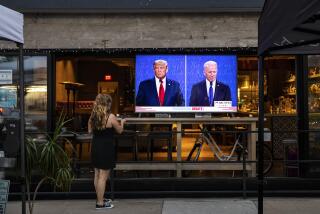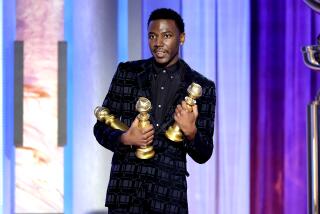When image isnât enough
NEW YORK â PBS development executives traveled to Dallas in October to honor Exxon Mobil Corp. with the first-ever âPBS Corporate Leadership Award.â As contributor of $250 million to public television over more than 30 years, Exxon Mobil certainly qualified for this unusual you-scratch-my-back-Iâll-scratch-yours honor to ârecognize companies that have demonstrated an extraordinary commitment to public broadcasting.â
But the timing couldnât have been more awkward: The oil giant had already served notice that it was looking long and hard at whether to continue its $9-million annual sponsorship of the signature PBS series âMasterpiece Theatre.â
When an Exxon Mobil executive accepted the award with just a terse bit of thanks, many thought they saw the handwriting on the wall for the bad news that the company would make official the following month: No more money for the drama series, effective in the 2004-05 season.
Exxon Mobilâs official reason for pulling out is that the company wants to target its messages in the environmental realms that more closely align with its businesses. Period British dramas donât qualify.
Itâs a message public broadcasting executives are hearing frequently these days. Some companies -- most recently, Volkswagen -- are supporting public TV for the first time. But many others are saying they simply have no extra pocket change in the down economy for image messages -- the only thing that public televisionâs strict rules allow -- that arenât directly tied to getting consumers to buy a product.
That puts PBS, and local stations that air its programming, in an increasingly difficult situation. The broadcaster is attempting to put together a slate of ambitious, diverse shows that will draw viewers at a time when cable is also targeting a similar audience with news, history and nature programming. But that takes money. âAmerican Family,â for one, the Latino drama that just ended a first year sponsored by Johnson & Johnson, wonât be back if more money doesnât come through.
âWeâre nervous,â said Bill Baker, president of New York station WNET. âWeâve got something wonderful here, but will we be able to tell that story?â
PBS President Pat Mitchell said recently that much of her time in her second three-year term, expected to be finalized soon, will be devoted to finding funding sources.
Corporate underwriting is only part of the PBS funding formula, which also includes federal and state funds, viewer donations and foundation support, but itâs a key one. In the 1990s, corporate funding soared by about 65%, to more than $110 million. In the last two years, however, that figure has dropped to $95 million, a level that will likely hold or maybe even drop again in 2003, said Wayne Godwin, PBSâ executive vice president and chief operating officer. PBS will spend about $164 million in fiscal year 2003 to acquire and promote shows in its National Program Service.
Nonetheless, Godwin remains optimistic for the longer term. âWeâve ridden the tiger before, and thereâs every reason to believe weâll come back from it,â he said.
In fact, PBS is looking at taking a key step this weekend to alleviate some of the problem. The board is expected to vote on whether PBS should start accepting 30-second underwriting credits -- PBS-speak for the soft-sell ads at the start and end of many PBS programs -- double the current 15-second limit.
The 30-second ads would be offered to PBSâ most generous underwriters -- those who give $2.5 million or more -- who have been clamoring for more time to tell their stories. Itâs a debate that has roiled public television stations, and a change that many viewers likely wouldnât even notice; the current one-minute limit on groups of promotional spots will remain. Moreover, of the 30 largest PBS stations, 26 now run local underwriting spots of that length, including KCET in Los Angeles. âWeâve had zero complaints from the audience,â said WNETâs Baker.
PBS has been reluctant to accept them, however, because some member stations fear that the change will be perceived as a step toward commercialism, perhaps endangering state and educational funding. In fact, just a year ago, PBS decided against even discussing longer credits because the debate was already âin the realm of religious wars,â Godwin said. âItâs a difficult, emotional, passionate subject for the system.â
But with Exxon Mobil threatening to pull out -- and putting longer ads on its list of desires -- PBS in the fall rushed the debate back through its committees. âExxon Mobil did not drive the discussion of 30s versus 15s, but it certainly was a contributing factor in getting the subject to the top of the priority list,â Godwin said. In the end, the company pulled out before PBS made its decision.
One person familiar with PBSâ development efforts -- and highly critical of its timidity, noting, âNo one does corporate branding in 15 secondsâ -- estimates PBS could double its corporate support simply by making the change. Godwin guesses it would be closer to a 10% to 15% increase.
There are other issues besides the length of spots. Where sponsorships used to be philanthropic gifts, decisions often made by the chief executive who wanted a promotional event in his town, now the money comes through ad agencies. âBut underwriting isnât just like advertising on TV,â Baker said. âIf strategically used by companies, it gives them credibility and visibility in an uncluttered environment.â
For agencies, cable offers easily measurable audiences; public television stations have the freedom to run shows at different times or not at all. One executive at a company weighing whether to continue PBS sponsorship complained about the endless PBS regulations about what can and canât be said and the slow, bureaucratic decision process that has made the company debate whether it isnât easier to reach the audience on cable. âSometimes, itâs not enough to go for what you believe in,â the executive said.
Other times, deals end up making sense for all involved. Johnson & Johnson sponsored Sept. 11 anniversary programming, a donation that Baker called âstrictly corporate responsibility, out of the goodness of the company.â General Electric just stopped national support for âThe McLaughlin Group,â which had been a favorite of former Chief Executive Jack Welch, but put several million dollars into the educational and family-oriented âFreedom: A History of US,â which it liked for the content and its local school and community components, one unique advantage PBS stations have, said spokeswoman Beth Comstock.
Elsewhere, âVictory Gardenâ has two new sponsors. Chubb Insurance just re-upped for âAntiques Roadshow.â And Volkswagen recently decided to underwrite public television for the first time, a quickly struck, multimillion-dollar deal to be sole corporate sponsor for âThe Blues,â an ambitious seven-film fall series executive produced by Martin Scorsese. The company and the series were a good fit in âattitude and authenticity,â said Lance Ozier, vice president, national program marketing, for Boston PBS station WGBH, which is producing the show.
Volkwagen marketing executive Stuart Karp said public TV is a good way to reach a more sophisticated audience and consumers older than the companyâs current average buyer age of 37. Karp said Volkswagen had no problem with the soft-sell approach. âWeâre not an in-your-face selling type of manufacturer.â
But Ozier has also been on the front line with the stationâs âMasterpiece Theatreâ and its spinoff âMystery!â The latter series lost its underwriting a few years back and got downgraded to a summer slot on PBS, although PBS agreed to fund new American -- not British -- mysteries. The first installment, a Tony Hillerman Native American mystery called âSkinwalkers,â aired to strong ratings in the fall, and carried no corporate support.
Ozier blamed the economy. âItâs made companies focus on really core activities. People want to drive sales. The first thing that gets left by the wayside are things that are less explicit and more associative and image-driven.â Moreover, he said, companies arenât making long-term decisions âbecause they donât know what their needs are going to be.â But quarterly ad buys donât make it possible for PBS to fund programs that are in development for a year or more.
One company, Ozier said, recently asked for sponsor time in seven of the first quarterâs 13 weeks, with a complicated schedule of three weeks on, two weeks off, and so on. âI understand thatâs the world they live in, but it doesnât mesh up with us,â Ozier said.
Nonetheless, Ozier is still optimistic a new sponsor will be found for âMasterpiece Theatre.â That match, he said âis going to get made in the territory of talking about quality and integrity. Itâs a soft message,â but some large companies have made inquiries, he said.
*
Where PBS gets its money
* Program and service fees from member stations: $153,226,000
* Educational product sales: $42,864,000
* Grants from the Corp. for Public Broadcasting and the U.S. Department of Education: $77,913,000
* Royalties, license fees and investment income: $43,747,000
* Corporate and foundation underwriting: $216,071,000
* Total revenues: $533,821,000
More to Read
The biggest entertainment stories
Get our big stories about Hollywood, film, television, music, arts, culture and more right in your inbox as soon as they publish.
You may occasionally receive promotional content from the Los Angeles Times.










